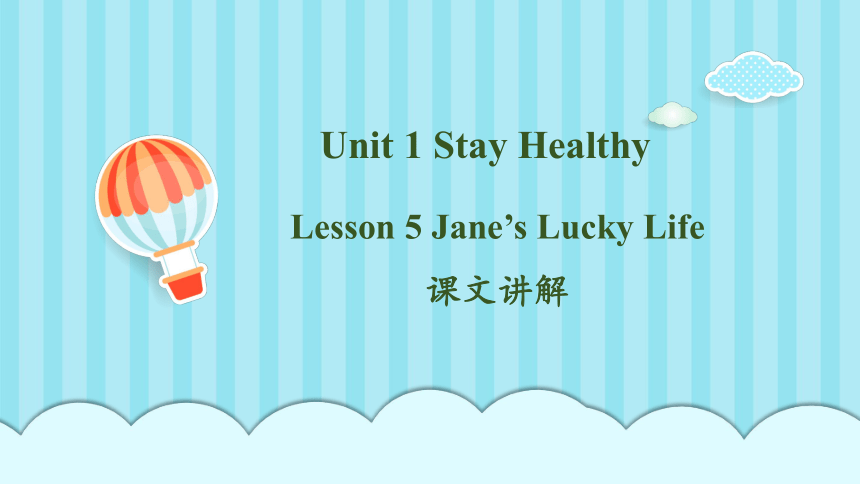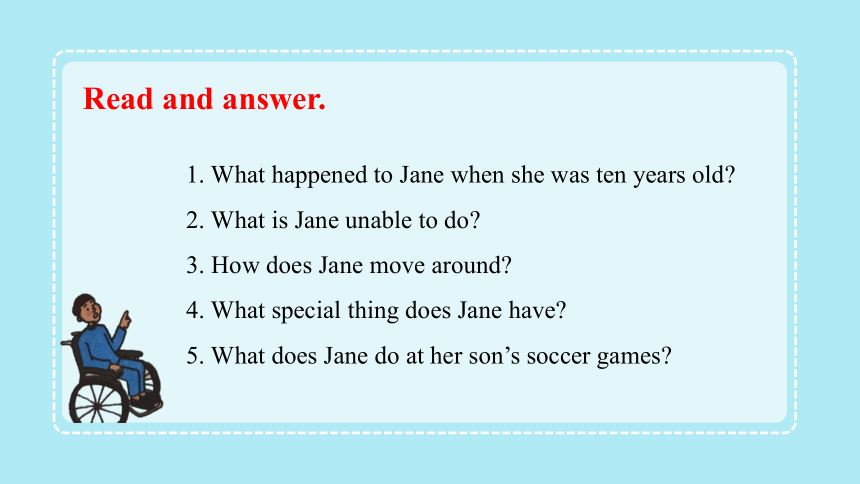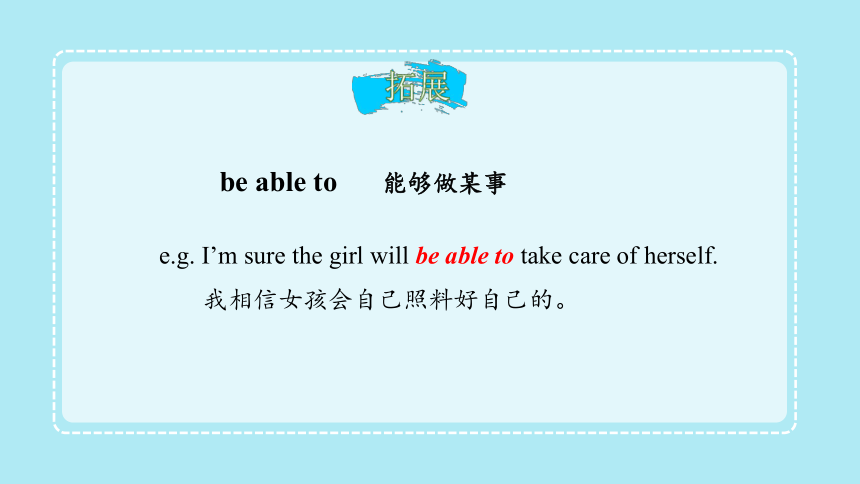Lesson 5 Jane's lucky life课文讲解课件(共26张PPT)
文档属性
| 名称 | Lesson 5 Jane's lucky life课文讲解课件(共26张PPT) |

|
|
| 格式 | zip | ||
| 文件大小 | 5.5MB | ||
| 资源类型 | 教案 | ||
| 版本资源 | 冀教版 | ||
| 科目 | 英语 | ||
| 更新时间 | 2021-09-18 11:14:37 | ||
图片预览









文档简介
(共26张PPT)
Lesson
5
Jane’s
Lucky
Life
课文讲解
Unit
1
Stay
Healthy
There
are
about
650
million
disabled
people
all
over
the
world.
Can
you
imagine
their
life?
1.
What
happened
to
Jane
when
she
was
ten
years
old?
2.
What
is
Jane
unable
to
do?
3.
How
does
Jane
move
around?
4.
What
special
thing
does
Jane
have?
5.
What
does
Jane
do
at
her
son’s
soccer
games?
Read
and
answer.
原文呈现
When
Jane
was
ten
years
old,
she
became
ill
with
a
terrible
disease.
This
disease
damaged
Jane's
body.
She
couldn't
move
her
arms
or
legs.
Jane
is
forty
years
old
now.
She
is
unable
to
do
many
things.
She
can't
brush
her
teeth.
She
can't
put
on
her
shoes.
She
can't
run
or
jump.
She
can't
make
breakfast.
But
she
dares
to
try
many
things.
She
has
a
wheelchair.
She
controls
her
wheelchair
with
her
mouth.
She
writes
letters
without
her
hands.
How
does
she
do
it?
She
talks
to
a
special
computer.
She
has
a
special
telephone
that
is
hers
alone.
She
can
answer
it
just
by
saying
"hello".
原文呈现
Jane
is
married
and
has
two
children.
She
likes
to
watch
her
eleven-year-old
son
play
soccer.
From
her
wheelchair,
Jane
cheers
as
her
son
runs
and
kicks
the
ball.
Her
daughter
likes
to
play
the
piano.
Jane
will
never
play
the
piano,
but
she
knows
a
lot
about
music.
She
enjoys
encouraging
her
daughter.
Jane
speaks
to
people
about
the
things
she
has
learned
as
a
disabled
person.
“Everyone
faces
problems.
If
you
only
focus
on
your
problems,
you'll
have
a
life
full
of
them.
I
don't
need
any
pity.
I
think
about
all
the
good
things
in
my
life.
I
have
a
life
full
of
good
things.
“Do
you
know
who
is
really
disabled?
People
who
don‘t
know
how
lucky
they
are.”
1.
What
happened
to
Jane
when
she
was
ten
years
old?
Read
and
answer.
She
couldn’t
move
her
arms
or
legs
because
of
a
terrible
disease.
When
Jane
was
ten
years
old,
she
became
ill
with
a
terrible
disease.
This
disease
damaged
Jane's
body.
She
couldn't
move
her
arms
or
legs.
damage
/'d?m?d?
/
v.
损害;损坏
2.
What
is
Jane
unable
to
do?
Read
and
answer.
She
is
unable
to
brush
her
teeth,
put
on
her
shoes,
run
or
jump,
or
make
breakfast.
Jane
is
forty
years
old
now.
She
is
unable
to
do
many
things.
She
can't
brush
her
teeth.
She
can't
put
on
her
shoes.
She
can't
run
or
jump.
She
can't
make
breakfast.
Jane
is
forty
years
old
now.
She
is
unable
to
do
many
things.
She
can't
brush
her
teeth.
She
can't
put
on
her
shoes.
She
can't
run
or
jump.
She
can't
make
breakfast.
be
unable
to
do
sth.
e.g.
He
was
unable
to
play
tennis
after
the
injury.
受伤后他不能打网球了。
不能做某事
拓展
be
able
to
e.g.
I’m
sure?the?girl?will?be?able?to?take
care
of?herself.
我相信女孩会自己照料好自己的。
能够做某事
3.
How
does
Jane
move
around?
Read
and
answer.
She
controls
her
wheelchair
with
her
mouth.
But
she
dares
to
try
many
things.
She
has
a
wheelchair.
She
controls
her
wheelchair
with
her
mouth.
But
she
dares
to
try
many
things.
She
has
a
wheelchair.
She
controls
her
wheelchair
with
her
mouth.
dare
to
do
sth.
e.g.
She
dares
to
walk
at
night.
她敢于走夜路。
敢于做某事
拓展
dare
sb.
to
do
sth.
激某人做某事
e.g.
Some
children
dared
him
to
jump
into
the
swimming
pool.
一些孩子激他跳进了游泳池。
dare
还可作情态动词,主要用于否定句和疑问句中。
e.g.
Daren't
you
read
the
words
on
the
note?
难道你不敢读便条上的话吗?
But
she
dares
to
try
many
things.
She
has
a
wheelchair.
She
controls
her
wheelchair
with
her
mouth.
n.轮椅
control
/k?n'tr??l/
All
the
things
are
back
in
control.
The
young
manager
controls
a
large
company.
n.
控制、管理、支配
v.控制;管理;支配
4.
What
special
thing
does
Jane
have?
Read
and
answer.
She
has
a
special
computer
and
a
special
telephone.
She
writes
letters
without
her
hands.
How
does
she
do
it?
She
talks
to
a
special
computer.
She
has
a
special
telephone
that
is
hers
alone.
She
can
answer
it
just
by
saying
"hello".
She
writes
letters
without
her
hands.
How
does
she
do
it?
She
talks
to
a
special
computer.
She
has
a
special
telephone
that
is
hers
alone.
She
can
answer
it
just
by
saying
"hello".
telephone
/'tel?f??n/
n.
电话;电话机
She
writes
letters
without
her
hands.
How
does
she
do
it?
She
talks
to
a
special
computer.
She
has
a
special
telephone
that
is
hers
alone.
She
can
answer
it
just
by
saying
"hello".
hers
/h?:z/
pron.
她的
She
writes
letters
without
her
hands.
How
does
she
do
it?
She
talks
to
a
special
computer.
She
has
a
special
telephone
that
is
hers
alone.
She
can
answer
it
just
by
saying
"hello".
by
介词,表示“靠,用,通过”
e.g.
By
using
the
Internet,
you
can
do
your
shopping
at
home.
使用因特网,你可以在家里购物。
5.
What
does
Jane
do
at
her
son’s
soccer
games?
Read
and
answer.
She
cheers
as
her
son
runs
and
kicks
the
ball
from
her
wheelchair..
Jane
is
married
and
has
two
children.
She
likes
to
watch
her
eleven-year-old
son
play
soccer.
From
her
wheelchair,
Jane
cheers
as
her
son
runs
and
kicks
the
ball.
Jane
is
married
and
has
two
children.
She
likes
to
watch
her
eleven-year-old
son
play
soccer.
From
her
wheelchair,
Jane
cheers
as
her
son
runs
and
kicks
the
ball.
cheer
/t???/
v.
欢呼;喝彩;加油
cheer
sb.
on
为某人加油
cheer
for
为……欢呼,喝彩;给…….加油
cheer
up
使高兴;高兴起来;使振奋
We
all
cheered
him
on.
I
also
cheer
for
myself
sometimes.
You
should
cheer
yourself
up.
cheer
n.
欢呼声;喝彩声
Jane
is
married
and
has
two
children.
She
likes
to
watch
her
eleven-year-old
son
play
soccer.
From
her
wheelchair,
Jane
cheers
as
her
son
runs
and
kicks
the
ball.
kick
/k?k/
v.
踢
kick
sth.
to
sb.
=kick
sb.
sth.
e.g.
Please
kick
the
ball
to
me.
=Please
kick
me
the
ball.
Jane
speaks
to
people
about
the
things
she
has
learned
as
a
disabled
person.
/d?s'e?bld/
adj.
肢体有残疾的
a
disabled
person
拓展
dis-
表示"不,消失掉"
dislike不喜欢(dis+like喜爱→不喜爱)
disorder无秩序(dis+order顺序→没有顺序)
dishonest不诚实的(dis+honest诚实的)
disappear消失(dis+appear出现→不出现→消失)
discourage使失去勇气(dis+courage勇气)
discover发现(dis+cover盖→把盖揭开→发现)
“Everyone
faces
problems.
If
you
only
focus
on
your
problems,
you'll
have
a
life
full
of
them.
I
don't
need
any
pity.
I
think
about
all
the
good
things
in
my
life.
I
have
a
life
full
of
good
things.
focus
on
集中于;致力于
e.g.
Don’t
talk.
Focus
on
driving.
别聊天了。专心开车。
“Everyone
faces
problems.
If
you
only
focus
on
your
problems,
you'll
have
a
life
full
of
them.
I
don't
need
any
pity.
I
think
about
all
the
good
things
in
my
life.
I
have
a
life
full
of
good
things.
pity
/'p?t?/
n.
同情;怜悯;遗憾
常用句型
It’s
a
pity.真遗憾
It’s
a
pity
(that)…
.
遗憾的是,可惜的是
e.g.
It’s
a
pity
(that)
you
can’t
stay
longer.
Unit
1-Lesson
5
课后作业(微课配套)
Bye-bye
Lesson
5
Jane’s
Lucky
Life
课文讲解
Unit
1
Stay
Healthy
There
are
about
650
million
disabled
people
all
over
the
world.
Can
you
imagine
their
life?
1.
What
happened
to
Jane
when
she
was
ten
years
old?
2.
What
is
Jane
unable
to
do?
3.
How
does
Jane
move
around?
4.
What
special
thing
does
Jane
have?
5.
What
does
Jane
do
at
her
son’s
soccer
games?
Read
and
answer.
原文呈现
When
Jane
was
ten
years
old,
she
became
ill
with
a
terrible
disease.
This
disease
damaged
Jane's
body.
She
couldn't
move
her
arms
or
legs.
Jane
is
forty
years
old
now.
She
is
unable
to
do
many
things.
She
can't
brush
her
teeth.
She
can't
put
on
her
shoes.
She
can't
run
or
jump.
She
can't
make
breakfast.
But
she
dares
to
try
many
things.
She
has
a
wheelchair.
She
controls
her
wheelchair
with
her
mouth.
She
writes
letters
without
her
hands.
How
does
she
do
it?
She
talks
to
a
special
computer.
She
has
a
special
telephone
that
is
hers
alone.
She
can
answer
it
just
by
saying
"hello".
原文呈现
Jane
is
married
and
has
two
children.
She
likes
to
watch
her
eleven-year-old
son
play
soccer.
From
her
wheelchair,
Jane
cheers
as
her
son
runs
and
kicks
the
ball.
Her
daughter
likes
to
play
the
piano.
Jane
will
never
play
the
piano,
but
she
knows
a
lot
about
music.
She
enjoys
encouraging
her
daughter.
Jane
speaks
to
people
about
the
things
she
has
learned
as
a
disabled
person.
“Everyone
faces
problems.
If
you
only
focus
on
your
problems,
you'll
have
a
life
full
of
them.
I
don't
need
any
pity.
I
think
about
all
the
good
things
in
my
life.
I
have
a
life
full
of
good
things.
“Do
you
know
who
is
really
disabled?
People
who
don‘t
know
how
lucky
they
are.”
1.
What
happened
to
Jane
when
she
was
ten
years
old?
Read
and
answer.
She
couldn’t
move
her
arms
or
legs
because
of
a
terrible
disease.
When
Jane
was
ten
years
old,
she
became
ill
with
a
terrible
disease.
This
disease
damaged
Jane's
body.
She
couldn't
move
her
arms
or
legs.
damage
/'d?m?d?
/
v.
损害;损坏
2.
What
is
Jane
unable
to
do?
Read
and
answer.
She
is
unable
to
brush
her
teeth,
put
on
her
shoes,
run
or
jump,
or
make
breakfast.
Jane
is
forty
years
old
now.
She
is
unable
to
do
many
things.
She
can't
brush
her
teeth.
She
can't
put
on
her
shoes.
She
can't
run
or
jump.
She
can't
make
breakfast.
Jane
is
forty
years
old
now.
She
is
unable
to
do
many
things.
She
can't
brush
her
teeth.
She
can't
put
on
her
shoes.
She
can't
run
or
jump.
She
can't
make
breakfast.
be
unable
to
do
sth.
e.g.
He
was
unable
to
play
tennis
after
the
injury.
受伤后他不能打网球了。
不能做某事
拓展
be
able
to
e.g.
I’m
sure?the?girl?will?be?able?to?take
care
of?herself.
我相信女孩会自己照料好自己的。
能够做某事
3.
How
does
Jane
move
around?
Read
and
answer.
She
controls
her
wheelchair
with
her
mouth.
But
she
dares
to
try
many
things.
She
has
a
wheelchair.
She
controls
her
wheelchair
with
her
mouth.
But
she
dares
to
try
many
things.
She
has
a
wheelchair.
She
controls
her
wheelchair
with
her
mouth.
dare
to
do
sth.
e.g.
She
dares
to
walk
at
night.
她敢于走夜路。
敢于做某事
拓展
dare
sb.
to
do
sth.
激某人做某事
e.g.
Some
children
dared
him
to
jump
into
the
swimming
pool.
一些孩子激他跳进了游泳池。
dare
还可作情态动词,主要用于否定句和疑问句中。
e.g.
Daren't
you
read
the
words
on
the
note?
难道你不敢读便条上的话吗?
But
she
dares
to
try
many
things.
She
has
a
wheelchair.
She
controls
her
wheelchair
with
her
mouth.
n.轮椅
control
/k?n'tr??l/
All
the
things
are
back
in
control.
The
young
manager
controls
a
large
company.
n.
控制、管理、支配
v.控制;管理;支配
4.
What
special
thing
does
Jane
have?
Read
and
answer.
She
has
a
special
computer
and
a
special
telephone.
She
writes
letters
without
her
hands.
How
does
she
do
it?
She
talks
to
a
special
computer.
She
has
a
special
telephone
that
is
hers
alone.
She
can
answer
it
just
by
saying
"hello".
She
writes
letters
without
her
hands.
How
does
she
do
it?
She
talks
to
a
special
computer.
She
has
a
special
telephone
that
is
hers
alone.
She
can
answer
it
just
by
saying
"hello".
telephone
/'tel?f??n/
n.
电话;电话机
She
writes
letters
without
her
hands.
How
does
she
do
it?
She
talks
to
a
special
computer.
She
has
a
special
telephone
that
is
hers
alone.
She
can
answer
it
just
by
saying
"hello".
hers
/h?:z/
pron.
她的
She
writes
letters
without
her
hands.
How
does
she
do
it?
She
talks
to
a
special
computer.
She
has
a
special
telephone
that
is
hers
alone.
She
can
answer
it
just
by
saying
"hello".
by
介词,表示“靠,用,通过”
e.g.
By
using
the
Internet,
you
can
do
your
shopping
at
home.
使用因特网,你可以在家里购物。
5.
What
does
Jane
do
at
her
son’s
soccer
games?
Read
and
answer.
She
cheers
as
her
son
runs
and
kicks
the
ball
from
her
wheelchair..
Jane
is
married
and
has
two
children.
She
likes
to
watch
her
eleven-year-old
son
play
soccer.
From
her
wheelchair,
Jane
cheers
as
her
son
runs
and
kicks
the
ball.
Jane
is
married
and
has
two
children.
She
likes
to
watch
her
eleven-year-old
son
play
soccer.
From
her
wheelchair,
Jane
cheers
as
her
son
runs
and
kicks
the
ball.
cheer
/t???/
v.
欢呼;喝彩;加油
cheer
sb.
on
为某人加油
cheer
for
为……欢呼,喝彩;给…….加油
cheer
up
使高兴;高兴起来;使振奋
We
all
cheered
him
on.
I
also
cheer
for
myself
sometimes.
You
should
cheer
yourself
up.
cheer
n.
欢呼声;喝彩声
Jane
is
married
and
has
two
children.
She
likes
to
watch
her
eleven-year-old
son
play
soccer.
From
her
wheelchair,
Jane
cheers
as
her
son
runs
and
kicks
the
ball.
kick
/k?k/
v.
踢
kick
sth.
to
sb.
=kick
sb.
sth.
e.g.
Please
kick
the
ball
to
me.
=Please
kick
me
the
ball.
Jane
speaks
to
people
about
the
things
she
has
learned
as
a
disabled
person.
/d?s'e?bld/
adj.
肢体有残疾的
a
disabled
person
拓展
dis-
表示"不,消失掉"
dislike不喜欢(dis+like喜爱→不喜爱)
disorder无秩序(dis+order顺序→没有顺序)
dishonest不诚实的(dis+honest诚实的)
disappear消失(dis+appear出现→不出现→消失)
discourage使失去勇气(dis+courage勇气)
discover发现(dis+cover盖→把盖揭开→发现)
“Everyone
faces
problems.
If
you
only
focus
on
your
problems,
you'll
have
a
life
full
of
them.
I
don't
need
any
pity.
I
think
about
all
the
good
things
in
my
life.
I
have
a
life
full
of
good
things.
focus
on
集中于;致力于
e.g.
Don’t
talk.
Focus
on
driving.
别聊天了。专心开车。
“Everyone
faces
problems.
If
you
only
focus
on
your
problems,
you'll
have
a
life
full
of
them.
I
don't
need
any
pity.
I
think
about
all
the
good
things
in
my
life.
I
have
a
life
full
of
good
things.
pity
/'p?t?/
n.
同情;怜悯;遗憾
常用句型
It’s
a
pity.真遗憾
It’s
a
pity
(that)…
.
遗憾的是,可惜的是
e.g.
It’s
a
pity
(that)
you
can’t
stay
longer.
Unit
1-Lesson
5
课后作业(微课配套)
Bye-bye
同课章节目录
- Unit 1 Stay Healthy
- Lesson 1 What's Wrong,Danny?
- Lesson 2 A Visit to the Dentist
- Lesson 3 Good Food, Good Health
- Lesson 4 Don't Smoke, Please!
- Lesson 5 Jane's Lucky Life
- Lesson 6 Stay Away from the Hospital
- Unit Review
- Unit 2 Great People
- Lesson 7 What Is the Meaning of Lift?
- Lesson 8 A Universe of Thought
- Lesson 9 China's Most Famous "Farmer"
- Lesson 10 Touch the World
- Lesson 11 To China, with Love
- Lesson 12 Guess My Hero!
- Unit Review
- Unit 3 Safety
- Lesson 13 Be Careful,Danny!
- Lesson 14 Accidents Happen
- Lesson 15 My Helmet Saved My Life!
- Lesson 16 How Safe Is Your Home?
- Lesson 17 Staying Safe in an Earthquake
- Lesson 18 Never Catch a Dinosaur
- Unit Review
- Unit 4 Stories and poems
- Lesson 19 A Story or a Poem?
- Lesson 20 Say It in Five
- Lesson 21 The Fable of the Woodcutte
- Lesson 22 The Giant(Ⅰ)
- Lesson 23 The Giant(Ⅱ)
- Lesson 24 Writing a Poem
- Unit Review
- Unit 5 Look into Science
- Lesson 25 Let's Do an Experiment!
- Lesson 26 Keep the Candle Burning
- Lesson 27 Planet Danny
- Lesson 28 The Study of Living Things
- Lesson 29 DNA—The Story of You
- Lesson 30 Science Affects Us
- Unit Review
- Unit 6 Movies and Theate
- Lesson 31 A movie or a Play
- Lesson 32 Moving Pictures
- Lesson 33 The Fisherman and the Goldfish(Ⅰ)
- Lesson 34 The Fisherman and the Goldfish(Ⅱ)
- Lesson 35 Theatres Are Fun!
- Lesson 36 Making Plays Is Fun
- Unit Review
